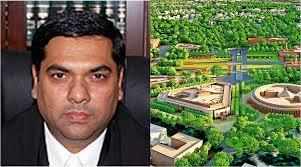Justice Khanna dissent on Central Vista project: Must make intelligible information public

HOLDING that public participation cannot be a mechanical exercise or formality in a decision-making process, Justice Sanjiv Khanna, in a dissenting judgment on the Central Vista project matter, Tuesday said that the right to make objections and suggestions will also include the right to have intelligible and adequate information regarding the proposal.
He made these comments on information made available to the public while inviting objections or suggestions to the proposed redevelopment of Central Vista, Parliament Building and Common Central Secretariat.
Before preparation of any plan and its submission to the central government, the Delhi Development Authority (DDA), under law, is required to invite objections and suggestions from the public or any local authority. The Authority has to also appoint a Board of Enquiry and Hearing (BoEH) for hearing and considering representations regarding the draft Master Plan.
While two judges on the Bench upheld the government’s decision to redevelop the Central Vista, Justice Khanna, in a separate ruling, disagreed on aspects relating to public participation in decision-making, failure to take prior approval of the Heritage Conservation Committee and the order passed by the Expert Appraisal Committee.
“Mere uploading of the gazette notification giving the present and the proposed land use with plot numbers was not sufficient compliance, but rather an exercise violating the express as well as implied stipulations, that is, necessity and requirement to make adequate and intelligible disclosure,” he said, adding that adjudication by courts cannot be a substitute for public participation before and at the decision-making stage.
Observing that the BoEH had acknowledged and accepted the lapse and failure — after hearing people who had expressed reservations regarding the proposal — and recommended disclosure, Justice Khanna said “intelligible and adequate disclosure” was critical given the nature of the proposal affecting the iconic Central Vista and that it was necessary for authorities to put in public domain the redevelopment plan, layouts and other such documents with “justification and explanatory memorandum” relating to the need and necessity, with studies and reports.
The ruling said there was lack of reasonable time for people, who filed objections and gave suggestions, to state their point of view. “The citizenry clearly had the right to know intelligible details explaining the proposal to participate and express themselves, give suggestions and submit objections. The proposed changes, unlike policy decisions, would be largely irreversible. Physical construction or demolition once done, cannot be undone or corrected for future by repeal, amendment or modification as in case of most policies or even enactments. They have far more permanent consequences,” Justice Khanna said.
He said the question whether the changes will curtail or restrict access of common people to the greens and other areas in the Central Vista is of particular importance. Observing that while authorities have claimed that the modification would not result in change in character of the Master Plan, Justice Khanna said reading of the tender notice published by the Central Public Works Department indicates that the proposed project does envisage extensive change to the landscape.
